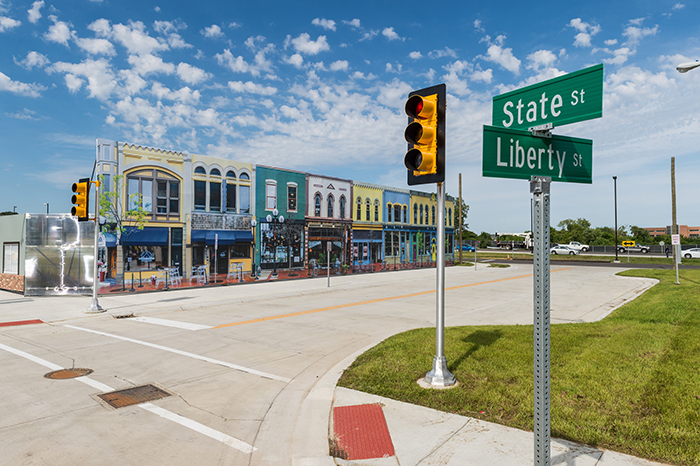
A tech haven located on the northern campus of the University of Michigan is redefining Michigan’s ‘Motor King’ reputation.
Mcity is a 32–acre complex designed to mimic urban and suburban city environments. Complete with painted building facades, dummy pedestrians, bike lanes, roads and highway ramps, the controlled laboratory environment eliminates real-world risks and serves as a unique testing ground for vehicle and urban transportation technology.
The combination of physical and virtual alteration possibilities within this ‘fake-city’ allow both for current real-life simulations as well as testing for speculative future mobility scenarios. The ability to replicate human-scale urban and suburban environments is vital for conducting tests to enhance current road safety and to plan for our evolving urban future.
The facility is involved in numerous research projects, including testing data collection and management systems, studying interactions between motor vehicles and bicyclists, enhancing pedestrian detection and avoidance technology, and improving intelligent parking guidance system.
Having access to a state-of-the-art testing facility such as Mcity provides tech companies with unparalleled development opportunities in their work and research. This fall, five emerging startups have been selected to work at Mcity alongside students at the University of Michigan’s TechLab.
Tome, based in Detroit, works on enhancing bicycle-to-vehicle (B2V) communication within the urban sphere. CARMERA, based in New York and Seattle, are experts in street-level intelligence focused on creating real-time 3-D maps and scene reconstructions vital for autonomous vehicle performance. RightHook, from San Jose, California, specializes in safely simulating harsh conditions to test the resiliency and performance of automated vehicles. Zendrive, of San Francisco, California, aims to increase driver safety through smartphone data collection. PolySync, from Portland, Oregon, builds software infrastructure and tools to develop autonomous vehicle functions.
